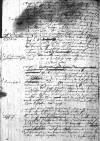Wir haben nicht wenig wolgef(a)lens gehabt aws E(wer) E(rbarkei)t negst ⌊⌋, / das uns ein hidden by binding⌈[in]in hidden by binding⌉ erbar(r), ernfest, unser lieb(e)r ⌊bruder⌋ und heuptman zu ⌊Rossel hidden by binding⌈[ossel]ossel hidden by binding⌉⌋ hot, mit anczeigen on the margin⌈anczeigenanczeigen on the margin⌉ viler woltath im von E(wer) E(rbarkei)t bewisen, / hot uber hidden by binding⌈[er]er hidden by binding⌉antwurt, / nemlich in dem, / das E(wer) E(rbarkei)t mit irer lieben hidden by binding⌈[ieben]ieben hidden by binding⌉ ⌊hausfrawen(n)⌋ zu gutter gesuntheit wider komen, die Got zu langen geczeitn(n) wolle bestetigen(n), / [...] hidden by binding⌈[...][...] hidden by binding⌉ der wir ouch E(wer) E(rbarkei)t / von wegen viler freuntlich[...] hidden by binding⌈[...][...] hidden by binding⌉ zwischen uns erwachssen uff zu kumfftiger tagfart zu Marienburg on the margin⌈uff zu kumfftiger ⌊tagfart⌋ zu ⌊Marienburg⌋uff zu kumfftiger tagfart zu Marienburg on the margin⌉ gern(n) wollten(n) sehen u[...] hidden by binding⌈[...][...] hidden by binding⌉ und freuntlich anreden(n) und bitten, / so es sich beg superinscribed in place of crossed-out ges[...]⌈ges[...] hidden by binding⌈[...][...] hidden by binding⌉ sich beg[...] hidden by binding⌈[...][...] hidden by binding⌉ sich beg superinscribed in place of crossed-out ges[...]⌉, das E(wer) E(rbarkei)t do hin ... illegible⌈...... illegible⌉, wie wir uns vorhoffen, / do [...] hidden by binding⌈[...][...] hidden by binding⌉ kueme, / wolde sich zu unserm(m) slechten haustische hidden by binding⌈[he]he hidden by binding⌉ zu komen(n) nicht besveren(n), / do mit wir zceitli[...] hidden by binding⌈[...][...] hidden by binding⌉ unsere alte kuntschafft und freuntschafft mocht(en) er hidden by binding⌈[er]er hidden by binding⌉newen(n). / Welchs uns E(wer) Er(barkei)t, / wie wir uns ge[...] hidden by binding⌈[...][...] hidden by binding⌉lich zu Ewer Erbarkeit, die wir gotlichnn gnad befelnn on the margin in place of crossed-out der⌈der E(wer) E(rbarkei)t, die wir gotlichn(n) gnad befeln(n) Ewer Erbarkeit, die wir gotlichnn gnad befelnn on the margin in place of crossed-out der⌉, wollen(n) versehen(n), / nicht wirt vorsag(en).

 AAWO, AB, D. 7, f. 9v (t.p.)
AAWO, AB, D. 7, f. 9v (t.p.)